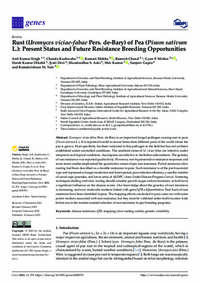Rust (Uromyces viciae-fabae Pers. de-Bary) of Pea (Pisum sativum L.): Present Status and Future Resistance Breeding Opportunities

Authors:
Uromyces viciae-fabae Pers. de-Bary is an important fungal pathogen causing rust in peas (Pisum sativum L.). It is reported in mild to severe forms from different parts of the world where the pea is grown. Host specificity has been indicated in this pathogen in the field but has not yet been established under controlled conditions. The uredinial states of U. viciae-fabae are infective under temperate and tropical conditions. Aeciospores are infective in the Indian subcontinent. The genetics of rust resistance was reported qualitatively. However, non-hypersensitive resistance responses and more recent studies emphasized the quantitative nature of pea rust resistance. Partial resistance/slow rusting had been described as a durable resistance in peas. Such resistance is of the pre-haustorial type and expressed as longer incubation and latent period, poor infection efficiency, a smaller number of aecial cups/pustules, and lower units of AUDPC (Area Under Disease Progress Curve). Screening techniques dealing with slow rusting should consider growth stages and environment, as both have a significant influence on the disease scores. Our knowledge about the genetics of rust resistance is increasing, and now molecular markers linked with gene/QTLs (Quantitative Trait Loci) of rust resistance have been identified in peas. The mapping efforts conducted in peas came out with some potent markers associated with rust resistance, but they must be validated under multi-location trails before use in the marker-assisted selection of rust resistance in pea breeding programs.
